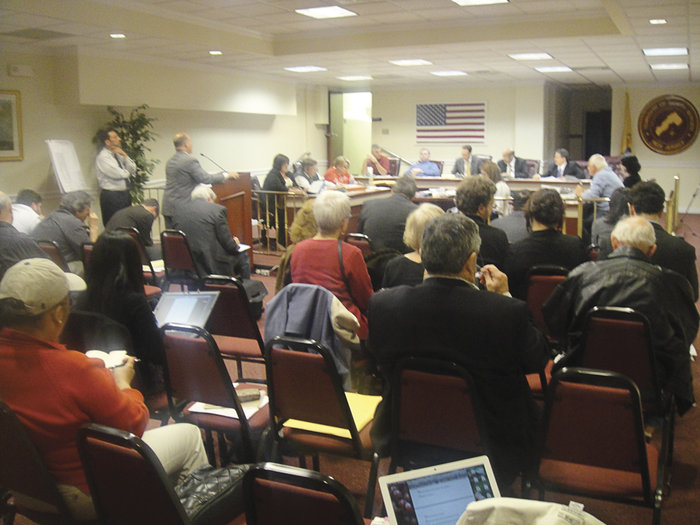The requirement in a Superior Court judge’s order that the Planning Board consider the safety ramifications of the Transco-Williams natural gas pipeline crossing the property where the Appleview condominium project has been proposed narrowed down to a technical debate among attorneys on Tuesday about the significance of an easement on the land.
Neighbors of the proposed site of the condo development at the North Bergen/Guttenberg border have expressed concerns over the proposed 59-unit project for the three years it has gone before both the North Bergen and Hudson County planning boards. Among the opponents of the project are residents of Guttenberg’s Galaxy Towers hi-rise. Their main concern is that construction might disrupt the pipeline.
The North Bergen Planning Board approved the project last year, but the matter was remanded back to the board after Judge Christine Farrington said the board did not sufficiently determine whether safety considerations had been met. She said testimony from a Transco representative should have been required.
“We never discussed that the township of North Bergen actually has to consent as a part owner of the property.” – John Lamb, attorney for opponents
____________
What does the easement mean?
Transco attorney Mark Stevens made a correction from the April 3rd meeting, when Galaxy Towers Attorney John Lamb questioned Rodriguez concerning a deed for the easement. According to Stevens, Rodriguez had said the company did not have an easement on the property, and Stevens provided a 1966 deed that he said proved the point.
“Lamb’s question to Rodriguez implied that there was an easement, either pre-existing or created by this document, whereas there is none,” Stevens said.
Attorney John Lamb, representing opponents of the project living in Galaxy Towers, read the deed differently. He maintained that the deed gave the township of North Bergen a piece of the tract for a sewer line, making the township part owner of the property, thus requiring the municipality’s consent to the project.
“The paragraph also indicates that the township of North Bergen apparently owns a piece of this property,” Lamb said, “something that we really didn’t focus on. We never discussed that the township of North Bergen actually has to consent as a part owner of the property.”
Lamb said along with the property owner the North Bergen Municipal Utilities Authority should be an applicant, an assertion which, if correct, might complicate an already complex case even further.
Rodriguez takes center stage once more
Lamb asked Rodriguez numerous questions about how the sewer easement crossed the gas pipeline.
“I don’t know,” Rodriguez replied. “I did not research the sewer easement. The sewer easement is not my concern, the pipeline easement is.”
Lamb asked Rodriguez to point out the sewer easement and the gas pipeline on a Transco site plan.
Board members, who are on their second round of hearings on this project, demanded to know what the sewer easement had to do with the construction of the building or the safety of the Transco pipeline.
“First of all, it’s not just for the construction,” Lamb said, “it’s how the entire project is going to operate in this environment. One of the factors of this is that there is a sewer easement that goes over the Transco easement. There are also buildings that are going to be excavated, that’s part of the project, and so you have a project which is going to have excavation on it which involves a sewer pipe which involves a Transco line. All of this is happening, whether during construction, or when the access easement is used after construction.”
He pointed out that Judge Farrington remanded the case back to the board specifically to address safety.
Stevens disagreed, saying Lamb was trying to expand the scope of the remand. Board members said they understood the remand was limited to construction and public safety issues with regard to the construction of this building.
Precautionary measures
“Rodriguez just admitted he has no idea whether they’re gonna burst tomorrow,” Lamb countered. “He doesn’t know what the conditions are.”
Rodriguez then insisted the sewer line would have no impact on the gas pipeline.
Lamb suggested that a risk assessment be done for crossing between sewer and gas pipeline “to see if there’s any effect or to eliminate it if there’s any adverse affect.” But Rodriguez said that would be unnecessary.
“There’s no need for me to review what is not happening. There’s no work proposed there.” The pipeline is actually near a corner of the lot, not where buildings are proposed.
The board asked Rodriguez if he believes that construction of this building will have any effect on the sewer.
Rodriguez responded, “I do not believe it has any affect. I do not believe it will disturb that crossing. It won’t be a problem for the sewer, won’t be a problem for us (Transco).”
To contradict this, Lamb presented two new pieces of evidence, an email and a letter, which Stevens adamantly opposed because they were generated by Transco from previous construction projects. Lamb insisted that Transco thought it important to review the soil cliff stability of a previous project that involved excavation into the cliffs and said it was also relevant for the Appleview project.
The board will determine the relevance of the documents entered into evidence along with their credibility.
The Appleview hearing will continue on Thursday, June 7.
